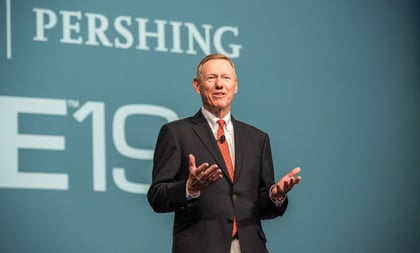Alan Mulally, who led the turnaround at Ford from 2006 to 2014 after running Boeing’s commercial aircraft business, built much of his career success through the use of ex-Boeing CEO Phil Condit’s “Working Together” approach. The engineer and executive shared how that framework can work for advisors at Pershing’s INSITE meeting this summer in Phoenix.
Some of Working Together’s key ingredients are integrity, honesty, respect and trust. Those who aren’t interested or able to follow its tenets, Mulally explained, are politely invited (and urged) to “move on to other opportunities.”
“It’s about trusting the process and having zero tolerance for violations,” he explained. “Enjoy the journey, but there’s no [joking or] humor at someone else’s expense. You go along to get along, or you don’t get [the insights from] sharing.”
In Working Together, everyone “knows how important they are [in the process] — suppliers, investors, employees, [customers] and beyond,” he said.
Having a positive attitude — or “finding a way” to accomplish a goal no matter the challenges — is also critical, Mulally said, explaining how Boeing and later Ford used color codes (green, yellow and red) to track progress and problems.
Mulally saw cultural change as the only way to move forward for a company with a $17 billion net loss. “I worked to bring all leaders together and go through my plans,” he said. This meant getting top managers to feel comfortable with problems — meaning being color coded yellow or red. “We had to say what [was] not going well,” Mulally told them. “And no one wanted to be the first to say something.”
That changed, thanks to Mark Fields and other Ford execs’ embrace of the Working Together. “It was about trusting the process [as a team], and then we knew that no matter what happened, we were going to be OK,” he said. Overall, the retired executive explained: “To be successful, you need to have a compelling vision, a comprehensive strategy and relentless implementation.”
‘The Infinite Game’









 August 27, 2019 at 03:00 PM
August 27, 2019 at 03:00 PM








